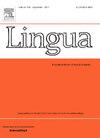令人震惊的预测:宏观经济学中[X-冲击]建筑综合体的兴起
IF 1.3
3区 文学
0 LANGUAGE & LINGUISTICS
引用次数: 0
摘要
经济学家是如何思考和谈论突发事件的呢?他们表示震惊,但不是典型意义上的惊讶。事实上,主流经济学家建立的模型中,冲击事件是预期变量。对经济学家中[x-冲击]结构(如 "技术冲击"、"供给冲击 "或 "货币冲击")的名义形式的调查显示,这种形式在 20 世纪后期急剧增加。我们报告了对有影响力的经济学教科书、顶级经济学期刊和美国联邦储备局文件进行的大规模实证调查。每个语料库都显示,从 20 世纪 80 年代开始,名义 [x-shock] 的出现频率急剧上升。这一定量分析为定性分析不同学派经济学家对[x-冲击]的不同用法奠定了基础。首先,名义冲击的兴起是一个去主体化过程的典型代表,在这个过程中,冲击从其更直接的经验用途转向了抽象因果关系的角色。其次,使用率的急剧上升与一些经济学派的一般均衡模型的兴起不谋而合。这些模型假设了一种特殊的力量动态逻辑。作为回应,其他学派则援引了与之相反的力动态逻辑。x-shock]结构的这些发展不仅显示了语义的变化,也显示了巩固这种变化的学科逻辑。本文章由计算机程序翻译,如有差异,请以英文原文为准。
Shocking projections: The rise of the [x-shock] construction complex in macroeconomics
How do economists think and talk about contingency? They express shock, but not in the typical sense of being surprised. In fact, mainstream economists build models in which shocking events are expected variables. An investigation of nominal forms in the [x-shock] construction (e.g., “technology shock,” “supply shock,” or “monetary shock”) among economists reveals a steep increase in the late twentieth century. We report on a large-scale empirical investigation of influential economic textbooks, top economic journals, and US Federal Reserve documents. Each corpus shows a steep rise in the frequency of nominal [x-shock] beginning in the 1980s. This quantitative analysis lays the groundwork for a qualitative analysis of the various uses of [x-shock] among economists from different schools. First, the rise of nominal shock typifies a process of de-subjectification in which shock moves from its more direct experiential uses toward a role of abstract causation. Second, the steep rise in usage coincides with the rise of general equilibrium models in some economic schools of thought. These models assume a particular type of force dynamic logic. In response, other schools invoke a contrasting force dynamic logic. These developments in the [x-shock] construction show not only semantic change but also the disciplinary logics consolidating that change.
求助全文
通过发布文献求助,成功后即可免费获取论文全文。
去求助
来源期刊

Lingua
Multiple-
CiteScore
2.50
自引率
9.10%
发文量
93
审稿时长
24 weeks
期刊介绍:
Lingua publishes papers of any length, if justified, as well as review articles surveying developments in the various fields of linguistics, and occasional discussions. A considerable number of pages in each issue are devoted to critical book reviews. Lingua also publishes Lingua Franca articles consisting of provocative exchanges expressing strong opinions on central topics in linguistics; The Decade In articles which are educational articles offering the nonspecialist linguist an overview of a given area of study; and Taking up the Gauntlet special issues composed of a set number of papers examining one set of data and exploring whose theory offers the most insight with a minimal set of assumptions and a maximum of arguments.
 求助内容:
求助内容: 应助结果提醒方式:
应助结果提醒方式:


